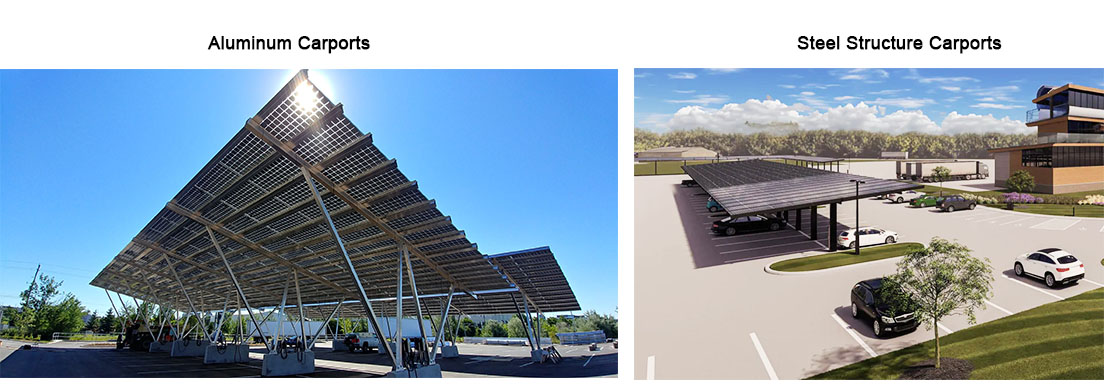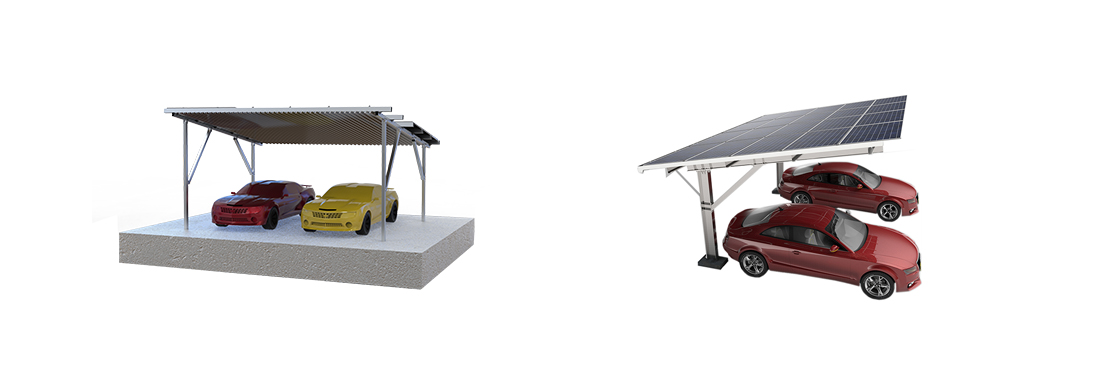Commercial solar carports(commercial solar canopy) are becoming an increasingly popular solution for businesses and organizations looking to combine sustainable energy with practical infrastructure. These innovative structures not only provide protection for vehicles but also harness solar energy to power buildings, charge electric vehicles, or contribute to the grid. In an era where sustainability meets functionality, commercial carports are revolutionizing how businesses approach parking solutions. Let's dive into the world of these innovative structures that are reshaping urban landscapes and powering our future.
Commercial solar carports are structures designed to provide shaded parking spaces while also generating renewable energy through solar panels installed on the roof of the carport. These carports are commonly found in business parks, shopping centers, corporate campuses, and other large-scale facilities. The dual benefit of protecting vehicles from the elements while producing clean, sustainable energy makes solar carport structures an attractive option for many commercial applications.
In addition to vehicle protection, solar carports can be used to power building operations, electric vehicle (EV) charging stations, or even supply energy to the surrounding area. They contribute to reducing electricity costs, lowering carbon footprints, and enhancing sustainability goals for businesses.
What are the commercial solar carport structures?
Commercial solar carports come in various structural designs to meet different needs, environmental conditions, and aesthetic preferences. Some of the most common structures include:
.Steel Structure Carports: These are the most widely used due to their strength, durability, and resistance to weather conditions. Steel carports can accommodate a large number of parking spaces and are typically used in commercial settings. T-frame or cantilever commercial metal type solar carport market,which is made of steel structure solar carport, is structurally more solid and aesthetically pleasing in thebusiness park, shopping centers, corporate campuses, and other large-scale facilities.
.Aluminum Carports: Lighter and more corrosion-resistant than steel, aluminum carports are another option for commercial applications, especially in coastal areas with high humidity or salt exposure.
.Custom Modular Carports: Some businesses opt for custom-designed modular carports that suit specific parking needs or unique site conditions.

The height of a commercial carport depends on several factors, including the type of vehicles that will be parked underneath and the overall design. Generally, the standard height for a commercial carport is between 10 to 14 feet (3 to 4.2 meters). This height is sufficient to accommodate standard passenger vehicles, SUVs, and light trucks.
If the carport is designed to handle larger vehicles such as buses, delivery trucks, or recreational vehicles (RVs), the height may need to be increased to 16 feet (4.9 meters) or more.
These heights ensure ample space for a variety of commercial vehicles, from delivery vans to small trucks, providing versatility for diverse business needs.
The solar potential of commercial carports is truly exciting:
Typical wattage: 300-400W panels are common
Total system size: Often ranges from 50kW to several MW
Energy output: Can power significant portions of business operations
but the number of solar panels for commercial carports largely depends on the available space, the energy needs of the facility, and the amount of sunlight in the area.
Imagine turning your parking area into a power plant! With the right setup, The system can be designed to generate enough energy to meet the on-site electricity demands, including powering lights, security systems, EV chargers, or even supplying power back to the grid. Somehow greatly reducing your energy bills!
Is It Suitable to Install Outdoor Batteries on Solar Carports?
Installing a commercial carport is a swift process:
Small to medium projects: 1-2 weeks
Large-scale installations: 4-8 weeks
The efficiency of installation minimizes disruption to your business operations. It's like watching a well-choreographed dance as these structures rise from the ground!
The ideal angle for your commercial carport's solar panels depends on your location:
General rule: Latitude of your location + 15° (for winter optimization)
Typical range: 20° to 30° in most U.S. locations
The angle of the solar panels installed on a commercial carport plays a crucial role in maximizing energy production. Ideally, solar panels should be installed at an angle that aligns with the local latitude to optimize sunlight absorption.
For most commercial solar carports, the optimal angle for solar panels is between 10° and 30°, depending on the location’s latitude. Panels that are tilted at these angles tend to capture the most direct sunlight, particularly during peak sunlight hours. In areas with higher latitudes or where winter sun angles are lower, panels may need a steeper tilt.
However, some carports use adjustable mounts or trackers to automatically adjust the tilt for optimal performance throughout the year.

Selecting the right supplier or manufacturers for a commercial solar carport is crucial to ensure the project is successful. Consider the following factors when choosing a supplier:
Experience and Reputation: Look for a supplier with proven experience in designing, manufacturing, and installing solar carports. A strong reputation and positive client reviews are good indicators of quality.
Customization Options: Ensure the supplier can offer a range of designs and customization options to meet your specific needs, such as the number of parking spaces, solar energy requirements, and aesthetic preferences.
Quality of Materials: Choose a supplier who uses durable, high-quality materials that are built to last. The quality of materials will directly affect the longevity and performance of the carport.
Solar Panel and Battery Technology: The supplier should be knowledgeable about the latest solar panel technology, energy storage solutions, and electrical systems integration.
Support and Maintenance: Check if the supplier offers ongoing maintenance services and support after installation to ensure your solar carport operates efficiently over time.
In addition, opting for an integrated supplier and manufacturer is the best choice. This approach minimizes communication gaps and significantly reduces costs and time. When the same entity handles both the supply and manufacturing, it leads to smoother project execution, better coordination, and fewer logistical challenges. This streamlined process not only saves you money but also ensures that your project is delivered on time and to the highest standard.
Commercial solar carports offer a practical and sustainable solution for businesses looking to reduce energy costs, enhance their green credentials, and provide sheltered parking for vehicles. By carefully considering the structure, size, solar panel wattage, and battery storage options, businesses can maximize the benefits of solar energy while protecting their investments. Selecting the right supplier is crucial to ensure a smooth installation process and long-term performance of the carport system.
With the increasing demand for sustainable solutions, commercial solar carports are a forward-thinking investment for any business looking to combine functionality with environmental responsibility.

 Xiamen TopFence Co.,Ltd.
Xiamen TopFence Co.,Ltd. No. 77, LingXia South Road, Huli District, Xiamen City, Fujian, China
No. 77, LingXia South Road, Huli District, Xiamen City, Fujian, China Tel: +8613365923720
Tel: +8613365923720
 Email: info@xmtopfence.com
Email: info@xmtopfence.com
 IPv6 network supported Sitemap
| XML
| Blog
| Privacy Policy
IPv6 network supported Sitemap
| XML
| Blog
| Privacy Policy


